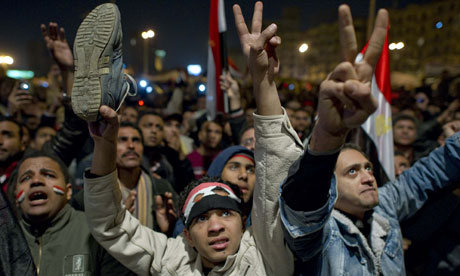Fury in Egypt as Mubarak refuses to leave
Massive protest expected after president hands over some powers to vice-president Suleiman – but remains in office
- The Guardian,
- Article history

President Hosni Mubarak dashed the hopes of hundreds of thousands of Egyptians waiting for what they thought would be his resignation speech last night by defiantly announcing that he would not bow to domestic or foreign pressure to quit.
In a televised address that has set the stage for further confrontation on the streets – as well as heightened tensions with the US – Mubarak said he would hand powers to his deputy, Omar Suleiman, but would stay on as president, with his regime controlling the transition to free elections.
Although he appeared to have surrendered much of his power, Mubarak said he will stay in office until an orderly transition to an elected government, planned for September. He repeated a pledge not to seek re-election and said there was no going back on a commitment to long-term political reform, after the two weeks of protests demanding his resignation.
But while the president's surrender of his legal powers was a significant concession, unthinkable just a month ago, it fell far short of the demands of the shocked crowds packed into Cairo's Tahrir Square, the centre of protests against Mubarak's 30-year rule. In a day of growing euphoria, many had come to believe he was about to resign entirely after senior government politicians predicted as much.
The president's defiant tone and attempts to paint the revolt as inspired by foreign interference angered the crowds. As the mood turned sour, protesters waved their shoes, a sign of contempt, and chanted: "He must leave" and "We're off to the presidential palace. We're going as millions of martyrs."
Opposition leaders said the transfer of power to Suleiman, the former intelligence chief who has played a central role in years of political repression, did not change the regime. They said they will escalate the protests, which in recent days have spread to include strikes that have shut down the public transport system, some hospitals and factories.
Mohamed ElBaradei, the Nobel peace prize winner and retired nuclear inspector who is now a leading opposition politician, wrote on Twitter: "Egypt will explode. Army must save the country now."
But the role of the military remained unclear when, earlier, it said it would act to "protect the rights of the people".
Egyptians will be watching to see if the army allows the latest of the mass protests, planned for today, to go ahead without interference.
Mubarak's speech also wrongfooted the US administration, which has been pressuring him to take steps toward democratisation, including lifting the hated state of emergency which has been used to suppress political activity. Last night, Barack Obama convened a meeting with his security team to discuss the crisis.
The Egyptian leader appealed to the protesters, suggesting that his refusal to resign was due to national dignity because he was resisting foreign pressure.
"Your demands are legitimate and just … There is no shame in hearing your voices and opinions, but I refuse any and all dictations from abroad," he said. "I have announced my commitment to peacefully hand over power after upcoming elections … I will deliver Egypt and its people to safety."
Mubarak said he would transfer powers to Suleiman to prove that the demands of protesters for political change will be met. Shortly afterwards, Suleiman appeared on television and missed a chance to win over the protesters by announcing immediate and major political changes. Instead, he aggravated tensions by warning that he would not allow the country to be dragged into chaos and appealing for the protesters to return to work.
"Youth of Egypt, go back home, back to work, the nation needs you to develop, to create. Don't listen to foreign radio and TV, whose aim is to tarnish Egypt," he said.
ElBaradei dismissed Suleiman as an alternative to the president. "There is no way that the Egyptian people right now are ready to accept either Mubarak or his vice president," he told CNN. "Suleiman is considered to be an extension of Mubarak, they are twins. Neither of them is acceptable to the people – even Suleiman is less acceptable."
Stunned protesters listened to Mubarak in disbelief. In the hours before his speech, thousands of pro-democracy activists had poured in to Tahrir Square for an impromptu victory party in expectation that the president was about to quit after the prime minister, Ahmed Shafiq, and other senior politicians said they expected him to announce he would go as the political crisis deepened with the spread of strikes and demonstrations across the country.
Hossam Badrawi, the new secretary general of the ruling party, was quoted in the state press as saying he had requested that Mubarak transfer his powers to Suleiman, who had appeared to be running the country in recent days.
The mood of optimism had been reinforced when General Hassan al-Roueini, military commander for the Cairo area, told the crowd: "All your demands will be met today." State television shifted from relentless anti-protester propaganda to showing Tahrir Square, in what was widely seen as reflecting a political change.
But, behind the scenes, there appeared to be a struggle involving the army underway over the terms of Mubarak's departure.
Activists have also been demanding an immediate lifting of the 30 year state of emergency that has been used to lock up the government's opponents without trial. They have also been pressing for parliament, elected in a tainted ballot last year from which leading opponents including the Muslim Brotherhood were barred, to be dissolved.

No comments:
Post a Comment